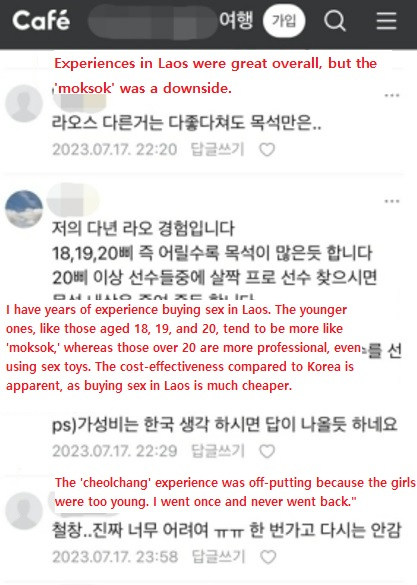 |
(Getty Images) |
South Koreans leaving online reviews about visiting prostitution establishments in Southeast Asian countries like Thailand, Vietnam and Laos have proliferated, despite legal prohibition both here for Koreans and there abroad, according to observers and legal experts here Monday.
The posts often use terms like "byeonma" -- referring to a clandestine brothel disguised as a massage parlor -- and "cheolchang" -- for an establishment where five to seven minors are confined in small, cagelike rooms. South Koreans who often identify themselves as men frequently use the terms online to exchange information about names, locations and prices at such venues, the experts said.
For example, a Naver Cafe group that launched in March 2004, but has since been shut down by the platform operator, once boasted over 18,000 members. Originally created to share travel tips, the cafe described itself as a community for exploring global food, entertainment and leisure at day and night.
However, before its closure, the forum became inundated with posts detailing experiences with prostitution, as The Korea Herald discovered through screenshots of comments posted there. Membership was restricted to men born between 1930 and 1994. To qualify as a "sincere" member, users were required to post general travel reviews after joining. Those seeking to access more exclusive sections of the forum, where explicit content was shared, had to contribute further details or share their own experiences with prostitution.
 |
Users share reviews after buying sex at a Naver Cafe group that opened in March 2004, which had over 18,000 members before its recent closure. (Screen capture from Naver) |
Captured images showed that users shared detailed accounts of their experiences. One user said that there were too many women in Laos who remain passive during intercourse, describing them as "moksok," meaning wood or stone. Others said they would not go back to a prostitution establishment that had minors locked in "cheolchang," saying they were too young and passive.
Online posts about purchasing sex abroad underscore limited progress in increasing public awareness of prostitution as an illegal act. South Korea criminalized prostitution 20 years ago, yet challenges in enforcement and public perception remain evident.
Calls have been made to "improve" the law with some activists calling to remove the punishment clause for women involved in prostitution and to strengthen penalties for buyers and brokers. Currently, no legal measures exist to penalize such online posts related to prostitution.
But experts here noted that such reviews can also be considered as "advertisements enticing or soliciting the act of buying sex," which would make them subject to charges of enticing prostitution.
"The act of explicitly mentioning the names of brothels and graphically describing encounters with sex workers at those establishments could be considered aiding prostitution advertising," professor Park Chan-geol of Chungbuk National University Law School said in a 2019 paper.
The issue of prostitution, including sexual exploitation of children, involving Korean tourists has been a persistent concern in and out of the country. The US State Department's annual human trafficking reports have repeatedly identified South Korean men as significant consumers of child sex tourism in Southeast Asia.
In response to international outcry over the sexual exploitation of children involving Korean tourists, the Korean Institute of Criminology recommended in 2013 that the government implement strong public campaigns against child sex tourism, collaborate with travel agencies to reduce demand and strengthen punishments for those paying to sexually exploit children.
Following this, in 2013 a total of 37 Korean men who traveled to the Philippines for prostitution were caught by the Seoul Metropolitan Police Agency. Since Korea adopted the nationality principle, Korean nationals engaging in prostitution overseas, even if it is legal in the foreign country they were visiting, can be punished under the Act on the Punishment of Arrangement of Commercial Sex Acts. These individuals, who were primarily office workers and self-employed people in their 30s and 40s, reportedly visited the Philippines three to four times a year for prostitution. When booking the individuals, police noted, "They have shared experiences and information online about brothels overseas, leading even well-intentioned others to fall prey to the lure of sex tourism."
In 2015, the Busan Metropolitan Police Agency also apprehended 207 Korean men for engaging in sex tourism in the Philippines.
Although the Korean government has not yet launched a widespread crackdown, buying sex abroad is illegal for Koreans and is subject to criminal charges.
"Some people believe that overseas prostitution is unlikely to be punished domestically due to investigative challenges. However, transaction details, such as bookings, can reveal the buyer's identity. Therefore, there is a significant possibility of being caught by domestic investigative authorities," said Kim Hyun-bin, the chief lawyer at Hwasin Law Office.
South Korea's digital boom has increased convenience but also opened a new realm of serious crime, exploiting anonymity to endanger minors and vulnerable individuals with modern slavery and online sex crimes. The Korea Herald delves into dark digital spaces and efforts to combat these crimes with this new series. This is the fourth installment. -- Ed.



![[Today’s K-pop] Blackpink’s Jennie, Lisa invited to Coachella as solo acts](http://res.heraldm.com/phpwas/restmb_idxmake.php?idx=644&simg=/content/image/2024/11/21/20241121050099_0.jpg)



